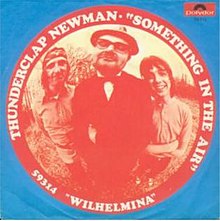Something in the Air (song)
| "Something in the Air" | ||||
|---|---|---|---|---|
 |
||||
| Single by Thunderclap Newman | ||||
| from the album Hollywood Dream | ||||
| B-side | "Wilhelmina" | |||
| Released | May 1969 | |||
| Format | 7" 45rpm |
|||
| Genre | Rock, art rock, psychedelic pop | |||
| Length | 3:53 | |||
| Label | Track Records 604031 | |||
| Writer(s) | Speedy Keen | |||
| Producer(s) | Pete Townshend | |||
| Thunderclap Newman singles chronology | ||||
|
||||
| "Something in the Air" | ||||
|---|---|---|---|---|
 |
||||
| Single by Tom Petty and the Heartbreakers | ||||
| from the album Greatest Hits | ||||
| Released | January 31, 1994 | |||
| Genre | Rock | |||
| Length | 3:17 | |||
| Label | MCA | |||
| Producer(s) | Rick Rubin | |||
| Tom Petty and the Heartbreakers singles chronology | ||||
|
||||
"Something in the Air" is a song recorded by Thunderclap Newman, written by Speedy Keen who also sang the song. It was a number 1 single for three weeks in the UK Singles Chart in July 1969. The song has been used for films, television and adverts, and has been covered by several artists. The track was also included on Thunderclap Newman's only album release Hollywood Dream over a year later.
In 1969, Pete Townshend, The Who's guitarist, was the catalyst behind the formation of the band. The concept was to create a band to perform songs written by drummer and singer Speedy Keen, who had written "Armenia City in the Sky", the first track on The Who Sell Out. Townshend recruited jazz pianist Andy 'Thunderclap' Newman (a friend from art college), and 15-year-old Glaswegian guitarist Jimmy McCulloch, who subsequently played lead guitar in Paul McCartney's Wings from 1974 to 1977 and died of a heroin overdose in 1979 aged just 26. Keen played the drums and sang the lead.
Townshend produced the single, arranged the strings, and played bass under the pseudonym Bijou Drains. Originally titled Revolution but later renamed to avoid confusion with the Beatles' 1968 song of that name, "Something in the Air" captured post-flower power rebellion, marrying McCulloch's sweeping acoustic and glowing electric guitars, Keen's powerful drumming and yearning falsetto, and Newman's felicitous piano solo.
The song, beginning in E major, has three key changes, its second verse climbing to F-sharp major, and, via a roundabout transition, goes down to C major for Newman's barrelhouse piano solo. Following this, the last verse is, like the second, a tone above the previous verse, closing the song in A-flat major.
...
Wikipedia
